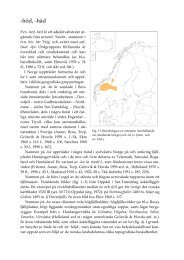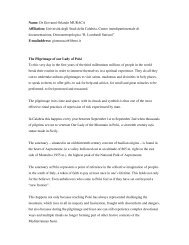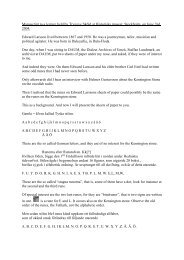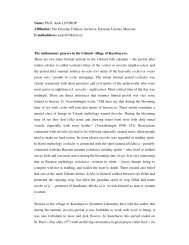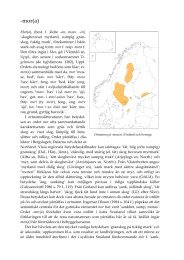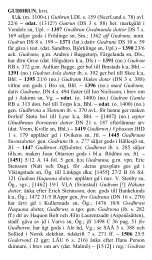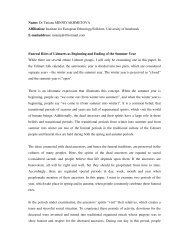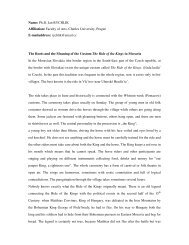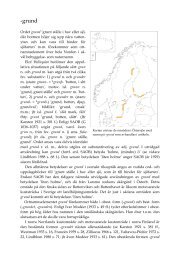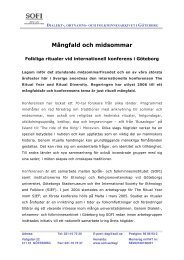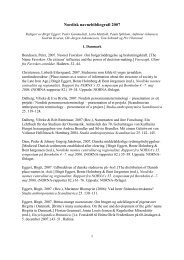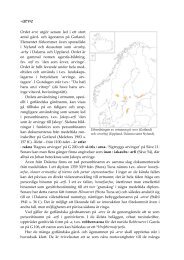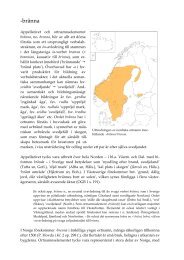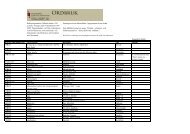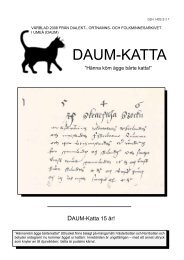NORNA-RAPPORTER 88 Binamn. Uppkomst, bildning, terminologi ...
NORNA-RAPPORTER 88 Binamn. Uppkomst, bildning, terminologi ...
NORNA-RAPPORTER 88 Binamn. Uppkomst, bildning, terminologi ...
Create successful ePaper yourself
Turn your PDF publications into a flip-book with our unique Google optimized e-Paper software.
Bynames as an expression of identity 27<br />
Neethling 2005). With the English and Afrikaans speaking respondents there<br />
were somewhat surprisingly also strong agreement regarding the link between<br />
name and identity. This was often the case when respondents knew the etymology<br />
of their given names although it is not obvious to others. The identity as<br />
revealed in the given first names seems to highlight an aspect of the identity of<br />
the respondents that they were proud of.<br />
The question about whether there is a link between name and identity, however,<br />
came strongly to the fore when the additional or bynames were taken into<br />
account. It is at this point that the views expressed above find application regarding<br />
the unstable and forever changing identities given the never ending<br />
changing circumstances individuals are exposed to nearly on a daily basis. As<br />
indicated earlier, individuals find themselves belonging to different groups,<br />
and in the process they construct and maintain different identities. The applicable<br />
one at any given time, is determined by the company they keep, and because<br />
these group formations come and go and are forever changing, so are old<br />
identities discarded and new identities created, or old ones are adapted or adjusted<br />
in order to fit the new or changed context in which the name carrier finds<br />
him/herself. Many respondents have more than one byname, and it is clear that<br />
the one used at any given time, is determined by the social context, i.e. who are<br />
present in the group and the activities operative in that context.<br />
It is probably also fair to say that most bynames are acquired at a teenage<br />
level (high school) and moving to young adulthood after school, such as in educational<br />
institutions like colleges and universities. It is at this time that close<br />
friendships are formed, and it is also a time when peer group pressure is high.<br />
A university campus like that of UWC is then likely to be fertile soil for producing<br />
a myriad of bynames. The other obvious source is at home and amongst<br />
family, even from a very young age. Some of these bynames are lost as children<br />
grow up, but some remain. Within close knit circles an aspect of endearment or<br />
affection is usually contained within bynames, often through affective diminuation.<br />
Different individuals or groups are responsible for coining these bynames.<br />
Felecan (2009:1) develops the notion of ‘polyphony’ to suggest that<br />
nicknames or bynames are the result of ‘a multitude of voices’, and not the result<br />
of a single act of denomination, but the joint usage of the appellative form<br />
by the entire community who validate it by the force of habit.<br />
All acquired bynames do not always have positive connotations. An unfortunate<br />
event in the life of the name carrier, even in early childhood may have<br />
given rise to a byname that has persisted in being used, despite likely futile efforts<br />
by the name carrier to be rid of that name. A physical feature, negative or<br />
positive, may also yield a byname. There are a number of such ‘negative’<br />
names in the responses, but it is also very likely that many respondents may<br />
simply not have included such names in their responses, not wishing to give it<br />
extended life. It is probably fair to argue that name carriers embrace the use of<br />
certain bynames, i.e. the positive ones, and may oppose, often in vain, the use<br />
of other more negative ones.



